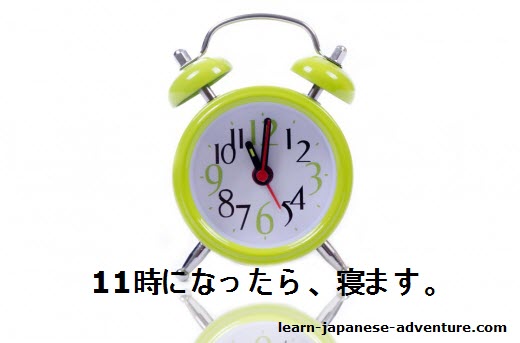- Home
- Intermediate Lessons
- たら tara Sentence Special Case
Special Case For たら tara Sentence -
Intermediate Lessons: 28
In the previous lesson, you have learned that grammatically たら tara sentence has no regulation.
But you need to choose the appropriate Japanese conditional form based on the conversational aspect if all 3 conditional forms: と (to), ば (ba) / なら (nara) and たら (tara) sentences are grammatically correct.

In this lesson, we'll look at 2 special cases when constructing conditional sentences where you definitely have to use たら tara sentence.
For such sentences, you'll notice that they can also be constructed using ば (ba) / なら (nara) sentence grammatically. But for reasons that I'll discuss later, たら tara sentence has to be used invariably.
Sentence Pattern
The sentence pattern for たら tara sentence is the same as the last lesson...
| Sentence 1 | たら、 | Sentence 2 |
The 2 special cases when たら tara sentence has to be used are:
- When the Condition is Different from the Reality
- When the Condition is Definitely Going to Happen in the Future
1. When the Condition is Different from the Reality
Example 1
Let's look at an example. Suppose your sister says the following...
- 私は男だったら、ラグビーがしたいです。 O
watashi wa otoko dattara, ragubi- ga shitai desu O
Meaning: If I were a man, I would want to play rugby.
According to the rules, you cannot use と (to) sentence because you cannot have expression of personal's hope ~したい (~shitai) in Sentence 2 for と (to) sentence.
But ば (ba) / なら (nara) sentence can be used in this case because there's no regulation for Sentence 2 if Sentence 1 is a noun sentence. That means grammatically your sister can say...
- 私は男なら、ラグビーがしたいです。 X
watashi wa otoko nara, ragubi- ga shitai desu X
Meaning: If I were a man, I would want to play rugby.
For ば (ba) / なら (nara) sentence, there are always 2 possibilities: either "if it happens" or "if it doesn't happen", either "if it rains" or "if it doesn't rain". Both possibilities can happen.
If your sister says 私は男なら、ラグビーがしたいです。 (watashi wa otoko nara, ragubi- ga shitai desu), it means she has the possibility of becoming a man.
However, in reality your sister can never be a man. It's certain that this cannot happen and therefore you cannot use ば (ba) / なら (nara) sentence here. You have to use たら tara sentence.
The meaning behind the above example is that your sister is not a man, therefore she cannot play rugby 私は男ではないから、ラグビーができません。 (watashi wa otoko dewanai kara, rugubi- ga dekimasen). But if she is a man, she would want to play rugby.
For this kind of assumption which is different from the reality, you have to use たら tara sentence.
Example 2
- 私は鳥だったら、日本へ飛んで行きたいです。 O
watashi wa tori dattara, nihon e tonde ikitai desu O
Meaning: If I were a bird, I would want to fly to Japan.
If you use ば (ba) / なら (nara) sentence which is correct grammatically...
- 私は鳥なら、日本へ飛んで行きたいです。 X
watashi wa tori nara, nihon e tonde ikitai desu X
Meaning: If I were a bird, I would want to fly to Japan.
The above example means you have the possibility to become a bird, which is impossible in reality. Therefore you can only use たら tara sentence.
Example 3
- 私は百万ドルがあったら、世界旅行をします。 O
watashi wa hyakuman doru ga attara, sekai ryokou wo shimasu O
Meaning: If I have one million dollar, I'll tour around the world.
Grammatically you can use ば (ba) / なら (nara) sentence and say the following...
- 私は百万ドルがあれば、世界旅行をします。 X
watashi wa hyakuman doru ga areba, sekai ryokou wo shimasu X
Meaning: If I have one million dollars, I'll tour around the world.
But in reality, it's quite impossible for you to have a million dollars. You are just dreaming.
While there's a possibility that you'll have a million dollars in the future, it's impossible (at least) for the moment when you are saying the sentence. Again, the correct way here is to use たら tara sentence.
2. When the Condition is Definitely Going to Happen in the Future
If the condition is definitely going to happen in the future, it's not a conditional sentence anymore.
In the previous lesson you have learned a similar example like the following...
- 雨が降れば、うちにいます。
ame ga fureba, uchi ni imasu
Meaning: If it rains, I'll stay at home.
- 雨が降らなければ、サッカーをします。
ame ga furanakereba, sakka- wo shimasu
Meaning: If it doesn't rain, I'll play soccer.
You don't know whether it's going to rain. So you use ば (ba) / なら (nara) sentence to make 2 opposite suppositions - "if it rains" and "if it doesn't rain".
These are conditional sentences where both situations are possible to happen. You can also use たら tara sentence for the same example...
- 雨が降ったら、うちにいます。
ame ga futtara, uchi ni imasu
Meaning: If it rains, I'll stay at home.
- 雨が降らなかったら、サッカーをします。
ame ga furanakattara, sakka- wo shimasu
Meaning: If it doesn't rain, I'll play soccer.
But if you know that the condition is definitely going to happen in the future, it's not a conditional sentence anymore. In this case, you have to use たら tara sentence.
Example 1
For example, if you are a student and say the following sentence...
- 夏休みが来たら、大阪へ行きます。
natsu yasumi ga kitara, oosaka e ikimasu
Meaning: When summer vacations comes, I will go to Osaka.
All students have summer vacation, so it's definitely coming. In this case it becomes "When summer vacation comes", not "If summer vacation comes".
If you were to use ば (ba) / なら (nara) sentence for the above example, 夏休みが来れば、大阪へ行きます。 (natsu yasumi ga kureba, oosaka e ikimasu). This sounds like you are not sure whether summer vacation is coming.
If it comes, you will go to Osaka. If it doesn't come, you will do something else. This sounds weird because summer vacation is definitely coming for every student.
Example 2
Let's look at another example. Suppose the time now is 9pm and you are going to bed at 11pm.
- 11時になったら、寝ます。
juuichi ji ni nattara, nemasu
Meaning: When it's 11pm, I will go to bed.
Time is always moving and you know that 11pm is definitely coming in 2 hours' time. So this is not a condition anymore and therefore you have to use たら tara sentence.
If you say 11時になれば、寝ます。 (juuichi ji ni nareba, nemasu), you don't know if 11pm is coming, which means there is a possibility that 11pm is not coming.
Example 3
Imagine you are 19 years old now and the minimum age in your country that you need to reach in order to get a driving license is 20 years old. You want to get your license once you reach the qualified age.
- 二十歳になったら、免許を取ります。
hatachi ni nattara, menkyo wo torimasu
Meaning: When I reach 20 years old, I will get the driving license.
You know that we all become older every year and nobody can avoid this. In the above example, you are definitely going to reach 20 years old in the future. Therefore you have to use たら tara sentence.
If you try to use ば (ba) / なら (nara) sentence and say 二十歳になれば、免許を取ります。 (hatachi ni nareba, menkyo wo torimasu), you are not sure whether you will reach 20 years old. That sounds weird and incorrect.
Conclusion
In all the above examples, although you can also use ば (ba) / なら (nara) sentence and they are all grammatically correct, the meanings are totally different.
Therefore, when the condition is different from the reality and when the condition is definitely going to happen in the future, you have to use たら tara sentence.
Related Pages
Lesson 24: と (to) Sentence.
Lesson 25: ても (temo) Sentence.
Lesson 26: ば (ba) / なら (nara) Sentence.
Lesson 27: たら (tara) Sentence.
Lesson 33: たら (tara) Sentence for Discovery.
Mystery Sales! Get 45% Forever OFF Premium & Premium PLUS! Ends on 20 Feb 2026
The link above is an affiliate link, which means that I would earn a commission (at no extra cost to you) if you do end up purchasing the related learning course.
Buy me a coffee








Facebook Comments
Don’t see the comments box? Log in to your Facebook account, give Facebook consent, then return to this page and refresh it.